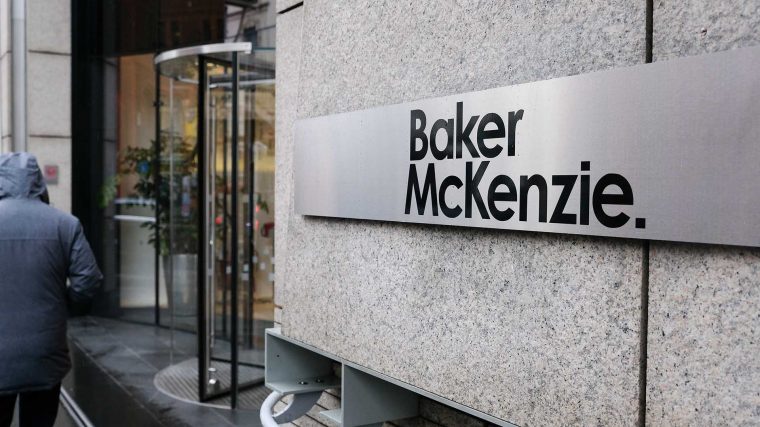In the ruins of the former Soviet Union, legal giant Baker McKenzie found lucrative work for Russia’s largest state-controlled companies. From energy titan Gazprom to banking behemoth VTB to Rostec, maker of Kalashnikov rifles and fighter jets, Baker McKenzie served President Vladimir Putin’s business interests around the globe.
Now America’s largest law firm says it is leaving Russia and dropping Russian clients in response to sweeping new sanctions aimed at weakening the country’s war against Ukraine.
“Baker McKenzie will no longer have a presence in Russia. The offices and the people will transfer to an independent firm,” spokesman John McGuinness said in an email to the International Consortium of Investigative Journalists today. “We are exiting relationships with all sanctioned Russian companies, and indeed will not act for any individuals or entities that are controlled by, or directly linked to, the Russian state and/or current regime, whether that work is in Russia or elsewhere in the world.”
As part of the Pandora Papers investigation, ICIJ and its media papers revealed in October that Baker McKenzie had represented at least six sanctioned companies controlled by the Russian government.
ICIJ’s investigation found that the Chicago-based law firm played a key role in creating the offshore economy, shaping financial laws, helping clients link up with offshore services providers and working with notorious fraudsters and autocratic regimes like Putin’s, as well as major corporations.
With 4,700 lawyers in 46 countries and annual revenue of $3.1 billion, Baker McKenzie is among those prestigious international law firms rethinking relations with the Kremlin in light of Russia’s invasion of Ukraine and the barrage of sanctions imposed by the United States and other Western governments.
More than a dozen major international law firms said in recent days that they are shutting their offices in Russia or winding down their Russia work after the invasion of Ukraine. They include Allen & Overy; Baker Botts; Clifford Chance; CMS; Debevoise & Plimpton; DLA Piper; Eversheds Sutherland; Freshfields; Gowling; Herbert Smith Freehills; Hogan Lovells; Latham & Watkins; Linklaters; Norton Rose Fulbright; and White & Case.
Although the United States allows lawyers to provide legal advice to sanctioned companies, Baker McKenzie and other law firms have come under mounting pressure to forgo Russia-related work and to sever relationships with entities linked to Putin.

“The high-profile pressure of global sanctions against Russia and some of the oligarchs combined with the overwhelming solidarity of the West has created a public relations nightmare for big Western law firms that have acted as gatekeepers\facilitators for big Russian money,” said Timothy White, special adviser to AML RightSource, an anti-money-laundering consulting firm. “Firms that have profited greatly from facilitating transactions for the oligarchs in the past are now doing everything they can to disassociate with anything Russian.”
The maneuvering to shutter offices and drop clients comes after more than three decades in which Western law firms helped safeguard and supercharge the wealth of many major state-controlled Russian companies.
The Pandora Papers and other leaked documents and public records show how prestigious U.K. and U.S. law firms have helped Russian oligarchs, their relatives and companies linked to them buy yachts and houses, settle personal and business disputes, navigate around sanction regimes, launch libel assaults against journalists, raise capital in Western markets and move money into and out of secret offshore deals.
Baker McKenzie’s decision to spin off its offices in Moscow and St. Petersburg means that 260 people, including 130 lawyers, will now operate as “a new, independent firm, which will make its own decisions,” spokesman McGuinness said.
In the statement posted on its website today, Baker McKenzie said: “We have made this difficult decision following ongoing consultation with our multinational clients, whose urgent on-the-ground legal needs we are serving, as well as careful consideration of the wellbeing of our many people in the wider region.”
The law firm had long considered itself a “go-to firm for Russia’s largest companies and major foreign investors,” according to its website.
After Russia’s invasion of Ukraine on Feb. 24, the firm said it planned to close its office in the Ukrainian capital, Kyiv, “until the situation stabilizes.”
As of March 9, the law firm said on its website that it represented VTB, Gazprom and other Kremlin-linked firms. As of this morning, that text had been scrubbed.
In its statement today, Baker McKenzie also condemned the Russian invasion of Ukraine, saying it “stands in stark contrast to our values, the values of our clients and those of the wider global business community.”
Baker McKenzie, which bills itself as “the original global law firm,’’ was one of the first Western law firms to set up shop in Moscow in 1989, as the Soviet Union became more open to Western businesses. In 1993, two years after the fall of the Soviet Union, Baker McKenzie partners set up a subsidiary on the Isle of Guernsey and adopted the name Baker & McKenzie CIS to handle work in former Soviet Republics. Its name derives from the Commonwealth of Independent States formed in the wake of the Soviet collapse.
With one of the largest practices in the region, Baker McKenzie has had among its clients some of the largest Western companies operating in the former Soviet Union, including Ford Motor Co. and Carlsberg beer.
ICIJ
